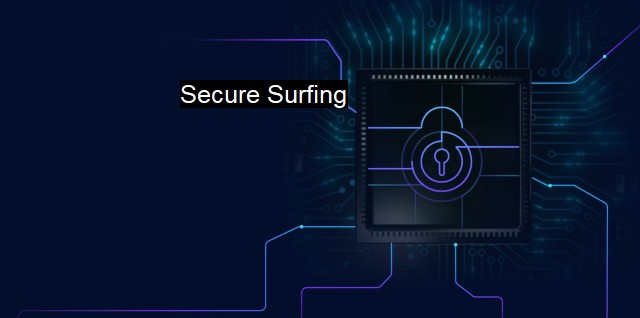What is Secure Surfing?
Secure Surfing: Protecting Yourself from Cyber Attacks with Cybersecurity and Antivirus
Secure surfing refers to the ability to safely navigate the internet without risking the exposure or theft of critical personal information. With the advent of digital technology, activities such as shopping, banking transactions, gaming, and streaming have migrated online. carrying out these activities securely requires precautionary measures to safeguard against cyber threats and attacks.Secure surfing entails surfers using the web in a manner that reduces their chances of falling into traps set by cybercriminals and attackers. These online criminals deploy various tactics like phishing, malware, and ransomware, intending to inflict harm or steal sensitive information. Robust antivirus applications are usually the first line of defense in secure surfing, protecting online surfers from becoming victims of these cyber threats.
Successful secure surfing cannot be achieved without employing reliable antivirus software. Antivirus software work tirelessly in the background to detect potential harmful content such as viruses, malware, and spyware that could cause great damage to individual computer systems, and by extension, the networks to which they are connected. effective antivirus software can intercept and eliminate virulent software from email attachments and prevent malicious application downloads, providing the surfer with an advance shield of protection.
Phishing attacks are one common cyber-threat confronting online users. This form of attack typically disguises itself as a trustworthy entity aiming to trick users into providing their sensitive data such as banking details, credit card numbers, and passwords by using a bogus website or email. Antivirus software can detect and warn users of suspicious emails which might carry such potential threats.
A significant component of secure surfing involves employing safe browsing practices such as differentiating between secure and insecure websites. Websites employing HTTPs security protocol indicate that your data is encrypted, reducing the likelihood of data theft or cyber attacks.
Another key aspect of secure surfing is the creation of strong, unique passwords for different sites. Passwords act as the gateway to personal accounts and information. Therefore, a more complex password prompts a greater challenge for cybercriminals intending to gain unauthorized access.
Many antivirus software now offer a feature known as VPN, or a Virtual Private Network, which further adds an extra layer of security. Surfing the internet with an active VPN conceals your IP address; hence, hiding your online activity from cybercriminals and would-be attackers.
Every individual leaving a digital footprint is equally responsible for building a safer internet space by practicing secure surfing. Regularly updating device software and web browsers, unclicking automatic logins, refraining from indulging personal information on websites that aren’t HTTPS encrypted, and not connecting to unsecured Wi-Fi networks are strong steps in the right direction.
Guarding personal information extends to skeptical sharing on social media. Cybercriminals often mine personal data revealed through social media posts and use it to figure out passwords or answer security questions.
Technology has interconnected the world, and the Internet has fostered unlimited virtual connections. each of these connections could expose one's personal information causing harm if not adequately protected. Therefore, secure surfing, supported by the employment of reliable antivirus software and safe browsing practices, is not just a recommendation; it's a necessity for users in this digital age. Your internet experience should not also turn into a nightmare due to cyber threats. Hence, always make sure to surf, explore, and enjoy the cyberspace securely.

Secure Surfing FAQs
What is secure surfing?
Secure surfing refers to the practice of browsing the internet in a secure manner, minimizing the risk of cybersecurity threats such as malware, spyware, viruses, and phishing attacks.What are some common tips for secure surfing?
Some common tips for secure surfing include using a reputable antivirus and firewall software, avoiding clicking on suspicious links or downloading attachments from unknown sources, using strong passwords and two-factor authentication, and staying up to date with software updates and security patches.What should I do if I suspect my device has been infected with malware?
If you suspect that your device has been infected with malware, it is important to take immediate action. This may include running a full antivirus scan, disconnecting your device from the internet, and seeking professional assistance from a cybersecurity expert.What is the role of antivirus software in secure surfing?
Antivirus software plays a critical role in secure surfing by identifying and removing malicious software from your device. It also helps to prevent infections in the first place by blocking suspicious activity and providing real-time protection against emerging threats. It is important to choose a reputable antivirus software and keep it up to date to ensure optimal protection.| | A | | | B | | | C | | | D | | | E | | | F | | | G | | | H | | | I | | | J | | | K | | | L | | | M | |
| | N | | | O | | | P | | | Q | | | R | | | S | | | T | | | U | | | V | | | W | | | X | | | Y | | | Z | |
| | 1 | | | 2 | | | 3 | | | 4 | | | 7 | | | 8 | | |||||||